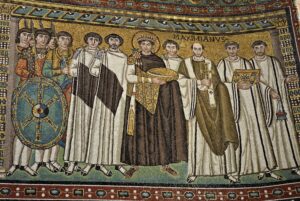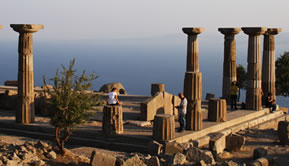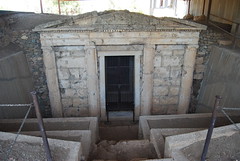JUSTINIAN – HOLY EMPEROR OR DEMON KING?
Peter Sarris weighs up Emperor Justinian’s enduring legacy and assesses where his real contributions lie
 The emperor with his officials in the famous mosaic at Ravenna
The emperor with his officials in the famous mosaic at Ravenna
The year 2023 marks an important anniversary for anyone interested in popular perceptions of the Byzantine (or ‘Eastern Roman’) Empire.
Four hundred years ago, in 1623, an Italian Catholic priest of Greek descent, Niccolò Alemanni, caused something of a publishing sensation. Alemanni was a renowned classical scholar and teacher of Greek. As a result, he had been appointed secretary to Cardinal Borghese, who served the Pope, and was made custodian of the Vatican Library in Rome. There he made a startling discovery. In the 530s and 540s the Eastern Roman Emperor Justinian (r. 527–65) had ordered his general Belisarius to lead a series of campaigns not only against the Sasanian Empire of Persia to the East, but also against the Goths and Vandals, who had helped to dismember the Western Roman Empire in the fifth century, carving out autonomous kingdoms for themselves in Italy and Africa respectively.
Belisarius had been accompanied on these campaigns by his secretary, Procopius, who had drawn upon his wealth of personal experience to write an eight-volume history of Justinian’s military endeavours. On face value, this History of the Wars seemed to glorify both Justinian and Belisarius. Both within Byzantium and beyond, it served to establish Procopius as one of the finest historians ever to have written in the Greek language.
The author also wrote a treatise celebrating the emperor’s building projects, including Justinian’s construction of the magnificent cathedral church of Hagia Sophia (which until the completion of St Peter’s Basilica in Rome in the 16th century would be the largest domed structure anywhere in the world).
It had long been known in Byzantium, however, that Procopius had also written, but never, it seemed, got round to publicly circulating, a ninth, additional volume to his Wars, in which he had turned on both Belisarius and Justinian. It was a manuscript copy of these ‘unpublished materials’ (known in Greek as Anekdota) that Alemanni had discovered in the Vatican Library, and which, in 1623, he published, alongside a Latin translation, under the title of the Historia Arcana ('Secret History').
In this shocking work, Belisarius was depicted as a clueless cuckold. Justinian, in turn, was denounced as a 'demon king', bent on the destruction of mankind, whose head would detach from his body and float around the palace late at night. Procopius also denounced the empress Theodora as a power-crazed harpy, renowned for her insatiable sexual appetites and her past as a prostitute on the streets of the imperial capital. Alemanni’s edition of the Secret History convulsed, fascinated and scandalized the intellectual world of 17th-century Europe, transforming forever the way Justinian would be viewed.
The reign of the Emperor Justinian had long stood out from the pages of Roman and Byzantine history. From the imperial capital of Constantinople, he had not only directed his armies against Persia, Africa and Italy (restoring both Carthage and Rome to imperial rule) but had even managed to establish an enclave in southern Spain. At home, Justinian had adorned his capital with a new cathedral and other stunning monuments, whilst also codifying and transforming Roman Law, overseeing the production of the Corpus Iuris Civilis on which the legal systems of Europe would depend until the ‘Age of Napoleon’. Accordingly, Justinian had been widely celebrated as a conqueror, builder and lawgiver. Alemanni’s edition of the Secret History, however, now cast him in a very different light. Accordingly, to the philosophes of the 18th century (the era of ‘Enlightenment’) he would be remembered chiefly as the epitome of oriental despotism.
Justinian’s reputation has never quite escaped the pall cast over it by Procopius. Even setting aside the Secret History, the primarily military focus of Procopius’ other writings continues to inform how scholars and the reading public have understood Justinian and his legacy. By the end of Justinian’s reign, the Roman Empire had re-established control over most of the Mediterranean coastline. But in the decades that followed Justinian’s death in 565, the empire suffered a dramatic reversal of fortunes. Italy was overrun by new barbarian invaders (the Lombards) from the late 560s; from the 570s onwards the empire’s Balkan territories were increasingly invaded and settled by Slavs; by around 625 the Visigoths once more drove Roman forces out of Spain. Most devastatingly of all, in the early 7th century, first the Persians and then the Arabs conquered Syria, Palestine and Egypt, largely reducing the East Roman Empire to an Anatolian rump.
The era of imperial expansion overseen by Justinian thus proved to be remarkably short-lived. Combining the negative critique of Justinian found within the Secret History with the military focus of Procopius’ History of the Wars, many have suspected that the emperor was guilty of a dangerous over-expansion which paved the way for the empire’s subsequent collapse.
Certainly, it has been commonly asserted that Justinian’s efforts at imperial renewal ultimately ended in failure, epitomised by the rapidity with which the empire’s western territories would once more slip beyond the reach of Constantinople. But is this assessment fair? In my new book – Justinian – Emperor, Soldier, Saint (Basic Books, 2023) I argue it is not, and that by viewing Justinian primarily from the essentially hostile and military perspectives of Procopius, we misconstrue both Justinian’s priorities and the nature of his achievement.
To start with, although Justinian did place great emphasis on confronting the Persians and securing his empire’s eastern frontier, his military campaigns to the West were only ever opportunistic in nature, taking advantage of weaknesses as they emerged in the barbarian kingdoms of Vandal Africa, Ostrogothic Italy and Visigothic Spain. In many ways these were campaigns on the cheap, to which Justinian committed resources only as and when other – more pressing – commitments permitted. There is no evidence that he possessed any over-arching plan to restore the Western Roman Empire of old, nor that he was willing to sacrifice the defence of his core territories to the East to achieve it.
Moreover, the great challenges that confronted the empire in the years after Justinian’s death cannot be causally linked in any way to the emperor and the policies he pursued. From the late 540s onwards there are signs that the empire found itself increasingly short of both military manpower and the funds needed to hold the empire together. The political instability that ensued as under-paid troops began to mutiny would lead to a civil war in the early 7th century. It was this civil war that would ultimately open the way to the Persian conquest of the Roman Near East.
But the primary cause of the military and fiscal shortfalls that would bedevil the empire from the late 540s onwards was not military over-expansion. Rather, it was the devastating bubonic plague (the ‘Plague of Justinian’) which first arrived in the Mediterranean in 541 before rapidly spreading as far afield as Britain. This pandemic would dramatically reduce the number of tax-payers and soldiers on whom the Roman state could rely.
Likewise, the Lombard invasion of Italy and the Slav settlement of the Balkans were chiefly the result of the westward migration from Central Asia of a group known as the Avars. This occurred by virtue of a major reconfiguration of power on the Eurasian steppe which (like the advent of the plague) was entirety beyond Justinian’s control. Such migratory pressures, for example, would appear to have been intensified by a major period of climatic instability that occurred at this time.
But perhaps most significantly, judging the success and legacy of Justinian chiefly in terms of the relatively short-lived nature of his western reconquests is fundamentally to misunderstand where Justinian’s chief interests lay. From the very start of his reign, Justinian’s priorities were overwhelmingly focused on law and religion. His accession to the throne witnessed an explosion of legal activism on the part of the emperor and his court whereby he overhauled the governmental structures of the Roman state and legislated on almost every aspect of life as lived in the 6th century.
Here we see Justinian pushing Roman law in new directions. In his codification of the inherited legal texts bequeathed from antiquity, Justinian’s law commissioners edited, condensed and re-worked the inherited legal materials so completely, that it is now very difficult to work out in any real detail what Roman law was like before Justinian. He and his commissioners ultimately determined the form in which Roman (or ‘Civil’) law would be received by both East and West in the Middle Ages and beyond.
Likewise, even before he became emperor, Justinian was fascinated by theology and determined to restore order and unity to the imperial church which, upon his accession to the throne, was wracked by disputes as to the nature of the relationship between the human and divine in the person of Christ. Justinian intervened in these disputes in person, trying to find a theological solution to them whilst also attempting to remove from office those bishops who proved most resistant to imperial Orthodoxy. At a great council of the Church which he convened in Constantinople in 553, Justinian and his court theologians finessed and (to the emperor’s mind) perfected Christian doctrine. Again, Christian ‘Orthodoxy’ as it would be received by both Greek East and Latin West in the Middle Ages was as defined by Justinian. At the same time, the emperor managed to drive out of the imperial church all those whom he regarded as enemies of the true faith.
Above all, throughout his reign, Justinian’s legal and religious interests combined in a concerted effort to bring to completion the Christianisation of the Roman state which had begun with the emperor Constantine’s adoption of Christianity in the 4th century. Through his laws he pressed ahead with unprecedentedly severe persecutions of pagans and heretics and imposed humiliating legal and social penalties on Samaritans and Jews. In this way, he sought to transform the Roman Empire into what he termed an ‘Orthodox Republic’, thereby laying the foundations for the more fully Christianised culture of medieval Byzantium.
But Justinian’s vision of a Christian society ruled over by a pious monarch, in which religious and other minorities would be extirpated or subjected to intense persecution, would ultimately be most fully realised not in Byzantium, but rather in the world of late medieval Latin Christendom, where rulers and clerical elites in the 11th, 12th, and 13th centuries would initiate purges and inquisitions of religious minorities in certain respects inspired by Justinian’s earlier legislation.
Justinian is often depicted as an emperor who attempted – and ultimately failed – to revive the past glories of the Roman Empire of old through his western campaigns. But Justinian’s chief priorities always lay primarily in the fields of law and religion, and as I argue in my new biography of him, in those fields his legacy would endure. Whether viewed as a ‘holy emperor’ or a ‘demon king’, Justinian made a fundamental contribution to the development of Byzantium, the formation of Christendom and through them the world in which we live today.
Justinian: Emperor, Soldier, Saint by Peter Sarris is published by Basic Books at £25 hardback and audio.









